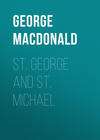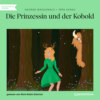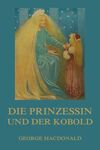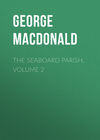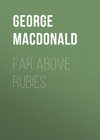Buch lesen: «St. George and St. Michael», Seite 14
CHAPTER XXIII
AMANDA—DOROTHY—LORD HERBERT
So also did Amanda; but not the less did she cherish feelings of revenge against her whom she more than suspected of having been the contriver of her harmful discomfiture. She felt certain that Dorothy had laid the snare into which they had fallen, with the hope if not the certainty of catching just themselves two in it, and she read in her, therefore, jealousy and cruelty as well as coldness and treachery. Rowland on the other hand was inclined to attribute the mishap to the displeasure of lord Herbert, whose supernatural acquirements, he thought, had enabled him both to discover and punish their intrusion. Amanda, nevertheless, kept her own opinion, and made herself henceforth all eyes and ears for Dorothy, hoping ever to find a chance of retaliating, if not in kind yet in plentiful measure of vengeance. Dorothy's odd ways, lawless movements, and what the rest of the ladies counted her vulgar tastes, had for some time been the subject of remark to the gossiping portion of the castle community; and it seemed to Amanda that in watching and discovering what she was about when she supposed herself safe from the eyes of her equals and superiors, lay her best chance of finding a mode of requital. Nor was she satisfied with observation, but kept her mind busy on the trail, now of one, now of another vague-bodied revenge.
The charge of low tastes was founded upon the fact that there was not an artisan about the castle, from Caspar downwards, whom Dorothy did not know and address by his name; but her detractors, in drawing their conclusions from it, never thought of finding any related significance in another fact, namely, that there was not a single animal either, of consequence enough to have a name, which did not know by it. There were very few of the animals indeed which did not know her in return, if not by her name, yet by her voice or her presence—some of them even by her foot or her hand. She would wander about the farmyard and stables for an hour at a time, visiting all that were there, and specially her little horse, which she had long, oh, so long ago! named Dick, nor had taken his name from him any more than from Marquis.
The charge of lawlessness in her movements was founded on another fact as well, namely, that she was often seen in the court after dusk, and that not merely in running across to the keep, as she would be doing at all hours, but loitering about, in full view of the windows. It was not denied that this took place only when the organ was playing—but then who played the organ? Was not the poor afflicted boy, barring the blank of his eyes, beautiful as an angel? And was not mistress Dorothy too deep to be fathomed? And so the tattling streams flowed on, and the ears of mistress Amanda willingly listened to their music, nor did she disdain herself to contribute to the reservoir in which those of the castle whose souls thirsted after the minutiae of live biography, accumulated their stores of fact and fiction, conjecture and falsehood.
Lord Herbert came home to bury his little one, and all that was left behind of her was borne to the church of St. Cadocus, the parish church of Raglan, and there laid beside the marquis's father and mother. He remained with them a fortnight, and his presence was much needed to lighten the heavy gloom that had settled over both his wife and his father.
As if it were not enough to bury the bodies of the departed, there are many, and the marquis and his daughter-in-law were of the number, who in a sense seek to bury their souls as well, making a graveyard of their own spirits, and laying the stone of silence over the memory of the dead. Such never speak of them but when compelled, and then almost as if to utter their names were an act of impiety. Not In Memoriam but In Oblivionem should be the inscription upon the tombs they raise. The memory that forsakes the sunlight, like the fishes in the underground river, loses its eyes; the cloud of its grief carries no rainbow; behind the veil of its twin-future burns no lamp fringing its edges with the light of hope. I can better, however, understand the hopelessness of the hopeless than their calmness along with it. Surely they must be upheld by the presence within them of that very immortality, against whose aurora they shut to their doors, then mourn as if there were no such thing.
Radiant as she was by nature, lady Margaret, when sorrow came, could do little towards her own support. The marquis said to himself, 'I am growing old, and cannot smile at grief so well as once on a day. Sorrow is a hawk more fell than I had thought.' The name of little Molly was never mentioned between them. But sudden floods of tears were the signs of the mother's remembrance; and the outbreak of ambushed sighs, which he would make haste to attribute to the gout, the signs of the grandfather's.
Dorothy, too, belonged in tendency to the class of the unspeaking. Her nature was not a bright one. Her spirit's day was evenly, softly lucent, like one of those clouded calm grey mornings of summer, which seem more likely to end in rain than sunshine.
Lord Herbert was of a very different temperament. He had hope enough in his one single nature to serve the whole castle, if only it could have been shared. The veil between him and the future glowed as if on fire with mere radiance, and about to vanish in flame. It was not that he more than one of the rest imagined he could see through it. For him it was enough that beyond it lay the luminous. His eyes, to those that looked on him, were lighted with its reflex.
Such as he, are, by those who love them not, misjudged as shallow. Depth to some is indicated by gloom, and affection by a persistent brooding—as if there were no homage to the past of love save sighs and tears. When they meet a man whose eyes shine, whose step is light, on whose lips hovers a smile, they shake their heads and say, 'There goes one who has never loved, and who therefore knows not sorrow.' And the man is one of those over whom death has no power; whom time nor space can part from those he loves; who lives in the future more than in the past! Has not his being ever been for the sake of that which was yet to come? Is not his being now for the sake of that which it shall be? Has he not infinitely more to do with the great future than the little past? The Past has descended into hell, is even now ascending glorified, and will, in returning cycle, ever and again greet our faith as the more and yet more radiant Future.
But even lord Herbert had his moments of sad longing after his dainty Molly. Such moments, however, came to him, not when he was at home with his wife, but when he rode alone by his troops on a night march, or when, upon the eve of an expected battle, he sought sleep that he might fight the better on the morrow.
CHAPTER XXIV
THE GREAT MOGUL
One evening, Tom Fool, and a groom, his particular friend, were taking their pastime after a somewhat selfish fashion, by no means newly discovered in the castle—that of teasing the wild beasts. There was one in particular, a panther, which, in a special dislike to grimaces, had discovered a special capacity for being teased. Betwixt two of the bars of his cage, therefore, Tom was busy presenting him with one hideous puritanical face after another, in full expectation of a satisfactory outburst of feline rancour. But to their disappointment, the panther on this occasion seemed to have resolved upon a dignified resistance to temptation, and had withdrawn in sultry displeasure to the back of his cage, where he lay sideways, deigning to turn neither his back nor his face towards the inferior animal, at whom to cast but one glance, he knew, would be to ruin his grand Oriental sulks, and fly at the hideous ape-visage insulting him in his prison. It was tiresome of the brute. Tom Fool grew more daring and threw little stones at him, but the panther seemed only to grow the more imperturbable, and to heed his missiles as little as his grimaces.
At length, proceeding from bad to worse, as is always the way with fools, born or made, Tom betook himself to stronger measures.
The cages of the wild beasts were in the basement of the kitchen tower, with a little semicircular yard of their own before them. They were solid stone vaults, with open fronts grated with huge iron bars—our ancestors, whatever were their faults, did not err in the direction of flimsiness. Between two of these bars, then, Tom, having procured a long pole, proceeded to poke at the beast; but he soon found that the pole thickened too rapidly towards the end he held, to pass through the bars far enough to reach him. Thereupon, in utter fool-hardiness, backed by the groom, he undid the door a little way, and, his companion undertaking to prevent it from opening too far, pushed in the pole till it went right in the creature's face. One hideous yell—and neither of them knew what was occurring till they saw the tail of the panther disappearing over the six-foot wall that separated the cages from the stableyard. Tom fled at once for the stair leading up to the stone-court, while the groom, whose training had given him a better courage, now supplemented by the horror of possible consequences, ran to warn the stablemen and get help to recapture the animal.
The uproariest tumult of maddest barking which immediately arose from the chained dogs, entered the ears of all in the castle, at least every one possessed of dog-sympathies, and penetrated even those of the rather deaf host of the White Horse in Raglan village. Dorothy, sitting in her room, of course, heard it, and hearing it, equally of course, hurried to see what was the matter. The marquis heard it where he sat in his study, but was in no such young haste as Dorothy: it was only after a little, when he found the noise increase, and certain other sounds mingle with it, that he rose in some anxiety and went to discover the cause.
Halfway across the stone court, Dorothy met Tom running, and the moment she saw his face, knew that something serious had happened.
'Get indoors, mistress,' he said, almost rudely, 'the devil is to pay down in the yard.' and ran on. 'Shut your door, master cook,' she heard him cry as he ran. 'The Great Mogul is out.'
And as she ran too, she heard the door of the kitchen close with a great bang.
But Dorothy was not running after the fool, or making for any door but that at the bottom of the library tower; for the first terror that crossed her mind was the possible fate of Dick, and the first comfort that followed, the thought of Marquis; so she was running straight for the stable-yard, where the dogs, to judge by the way they tore their throats with barking, seemed frantic with rage.
No doubt the panther, when he cleared the wall, hoped exultant to find himself in the savage forest, instead of which he came down on the top of a pump, fell on the stones, and the same instant was caught in a hurricane of canine hate. A little hurt and a good deal frightened, for he had not endured such long captivity without debasement, he glared around him with sneaking enquiry. But the walls were lofty and he saw no gate, and feeling unequal at the moment to the necessary spring, he crept almost like a snake under what covert seemed readiest, and disappeared—just as the groom entering by a door in one of the walls began to look about for him in a style wherein caution predominated. Seeing no trace of him, and concluding that, as he had expected, the clamour of the dogs had driven him further, he went on, crossing the yard to find the men, whose voices he heard on the green at the back of the rick-yard, when suddenly he found that his arm was both broken and torn. The sight of the blood completed the mischief, and he fell down in a swoon.
Meantime Dorothy had reached the same door in the wall of the stableyard, and peeping in saw nothing but the dogs raging and RUGGING at their chains as if they would drag the earth itself after them to reach the enemy. She was one of those on whose wits, usually sedate in their motions, all sorts of excitement, danger amongst the rest, operate favourably. When she specially noticed the fury of Marquis, the same moment she perceived the danger in which he, that was, all the dogs, would be, if the panther should attack them one by one on the chain; not one of them had a chance. With the thought, she sped across the space between her and Marquis, who—I really cannot say WHICH concerning such a dog—was fortunately not very far from the door. Feeling him a little safer now that she stood by his side, she resumed her ocular search for the panther, or any further sign of his proximity, but with one hand on the dog's collar, ready in an instant to seize it with both, and unclasp it.
Nor had she to look long, for all the dogs were straining their chains in one direction, and all their lines converged upon a little dark shed, where stood a cart: under the cart, between its lower shafts, she caught a doubtful luminousness, as if the dark while yet dark had begun to throb with coming light. This presently seemed to resolve itself, and she saw, vaguely but with conviction, two huge lamping cat-eyes. I will not say she felt no fear, but she was not terrified, for she had great confidence in Marquis. One moment she stood bethinking herself, and one glance she threw at the spot where her mastiff's chain was attached to his collar: she would fain have had him keep the latter to defend his neck and throat: but alas! it was as she knew well enough before—the one was riveted to the other, and the two must go together.
And now first, as she raised her head from the momentary inspection, she saw the groom lying on the ground within a few yards of the shed. Her first thought was that the panther had killed him, but ere a second had time to rise in her mind, she saw the terrible animal creeping out from under the cart, with his chin on the ground, like the great cat he was, and making for the man.
The brute had got the better of his fall, and finding he was not pursued, the barking of the dogs, to which in moderation he was sufficiently accustomed, had ceased to confuse him, he had recovered his awful self, and was now scenting prey. Had the man made a single movement he would have been upon him like lightning; but the few moments he took in creeping towards him, gave Dorothy all the time she needed. With resolute, though trembling hands, she undid Marquis's collar.
The instant he was free, the fine animal went at the panther straight and fast like a bolt from a cross-bow. But Dorothy loved him too well to lose a moment in sending even a glance after him. Leaving him to his work, she flew to hers, which lay at the next kennel, that of an Irish wolf-hound, whose curling lip showed his long teeth to the very root, and whose fury had redoubled at the sight of his rival shooting past him free for the fight. So wildly did he strain upon his collar, that she found it took all her strength to unclasp it. In a much shorter time, however, than she fancied, O'Brien too was on the panther, and the sounds of cano-feline battle seemed to fill every cranny of her brain.
But now she heard the welcome cries of men and clatter of weapons. Some, alarmed by Tom Fool, came rushing from the guard-rooms down the stair, and others, chiefly farm-servants and grooms, who had heard the frightful news from two that were in the yard when the panther bounded over the wall, were approaching from the opposite side, armed with scythes and pitchforks, the former more dangerous to their bearers than to the beast.
Dorothy, into whom, girl as she was, either Bellona or Diana, or both, had entered, was now thoroughly excited by the conflict she ruled, although she had not wasted a moment in watching it. Having just undone the collar of the fourth dog, she was hounding him on with a cry, little needed, as she flew to let go the fifth, a small bull-terrier, mad with rage and jealousy, when the crowd swept between her and her game. The beast was captured, and the dogs taken off him, ere the terrier had had a taste or Dorothy a glimpse of the battle.
As the men with cart-ropes dragged the panther away, terribly torn by the teeth of the dogs, and Tom Fool was following them, with his hands in his pockets, looking sheepish because of the share he had had in letting him loose, and the share he had not had in securing him again, Dorothy was looking about for her friend Marquis. All at once he came bounding up to her, and, exultant in the sense of accomplished duty, leaped up against her, at once turning her into a sanguineous object frightful to behold; for his wounds were bad, although none of them were serious except one in his throat. This upon examination she found so severe that to replace his collar was out of the question. Telling him therefore to follow her, in the confidence that she might now ask for him what she would, she left the yard, went up the stair, and was crossing the stone court with the trusty fellow behind her, making a red track all the way, when out of the hall came the marquis, looking a little frightened. He started when he saw her, and turned pale, but perceiving instantly from her look that, notwithstanding the condition of her garments, she was unhurt, he cast a glance at her now rather disreputable-looking attendant, and said,
'I told you so, mistress Dorothy! Now I understand! It is that precious mastiff of yours, and no panther of mine, that has been making this uproar in my quiet house! Nay, but he looks evil enough for any devil's work! Prithee keep him off me.'
He drew back, for the dog, not liking the tone in which he addressed his mistress, had taken a step nearer to him.
'My lord,' said Dorothy, as she laid hold of the animal, for the first and only time in her life a little inclined to be angry with her benefactor, 'you do my poor Marquis wrong. At the risk of his own life he has just saved your lordship's groom, Shafto, from being torn in pieces by the Great Mogul.'
While she spoke, some of those of the garrison who had been engaged in securing the animal came up into the court, and attracted the marquis's attraction by their approach, which, in the relaxation of discipline consequent on excitement, was rather tumultuous. At their head was lord Charles, who had led them to the capture, and without whose ruling presence the enemy would not have been re-caged in twice the time. As they drew near, and saw Dorothy stand in battle-plight, with her dog beside her, even in their lord's presence they could not resist the impulse to cheer her. Annoyed at their breach of manners, the marquis had not however committed himself to displeasure ere he spied a joke:
'I told you so, mistress Dorothy!' he said again. 'That rival of mine has, as I feared, already made a party against me. You see how my own knaves, before my very face, cheer my enemy! I presume, my lord,' he went on, turning to the mastiff, and removing his hat, 'it will be my wisdom to resign castle and title at once, and so forestall deposition.'
Marquis replied with a growl, and amidst subdued yet merry laughter, lord Charles hastened to enlighten his father.
'My lord,' he said, 'the dog has done nobly as ever dog, and deserves reward, not mockery, which it is plain he understands, and likes not. But it was not the mastiff, it was his fair mistress I and my men presumed on saluting in your lordship's presence. No dog ever yet shook off collar of Cranford's forging; nor is Marquis the only dog that merits your lordship's acknowledgment: O'Brien and Tom Fool—the lurcher, I mean—seconded him bravely, and perhaps Strafford did best of all.'
'Prithee, now, take me with thee,' said the marquis. 'Was, or was not the Great Mogul forth of his cage?'
'Indeed he was, my lord, and might be now in the fields but for cousin Vaughan there by your side.'
The marquis turned and looked at her, but in his astonishment said nothing, and lord Charles went on.
'When we got into the yard, there was the Great Mogul with three dogs upon him, and mistress Dorothy uncollaring Tom Fool and hounding him at the devilish brute; while poor Shafto, just waking up, lay on the stones, about three yards off the combat. It was the finest thing I ever saw, my lord.'
The marquis turned again to Dorothy, and stared without speech or motion.
'Mean you—?' he said at length, addressing lord Charles, but still staring at Dorothy; 'Mean you—?' he said again, half stammering, and still staring.
'I mean, my lord,' answered his son, 'that mistress Dorothy, with self-shown courage, and equal judgment as to time and order of attack, when Tom Fool had fled, and poor Shafto, already evil torn, had swooned from loss of blood, came to the rescue, stood her ground, and loosed dog after dog, her own first, upon the animal. And, by heaven! it is all owing to her that he is already secured and carried back to his cage, nor any great harm done save to the groom and the dogs, of which poor Strafford hath a hind leg crushed by the jaws of the beast, and must be killed.'
'He shall live,' cried the marquis, 'as long as he hath legs enough to eat and sleep with. Mistress Dorothy,' he went on, turning to her once more, 'what is thy request? It shall be performed even to the half of—of my marquisate.'
'My lord,' returned Dorothy, 'it is a small deed I have strewn to gather such weighty thanks.'
'Be honest as well as brave, mistress. Mock me no modesty.' said the marquis a little roughly.
'Indeed, my lord, I but spoke as I deemed. The thing HAD to be done, and I did but do it. Had there been room to doubt, and I had yet done well, then truly I might have earned your lordship's thanks. But good my lord, do not therefore recall the word spoken,' she added hurriedly, 'but grant me my boon. Your lordship sees my poor dog can endure no collar: let him therefore be my chamber-fellow until his throat be healed, when I shall again submit him to your lordship's mandate.'
'What you will, cousin. He is a noble fellow, and hath a right noble mistress.'
'Will you then, my lord Charles, order a bucket of water to be drawn for me, that I may wash his wounds ere I take him to my chamber?'
Ten men at the word flew to the draw-well, but lord Charles ordered them all back to the guard-room, except two whom he sent to fetch a tub. With his own hands he then drew three bucketfuls of water, which he poured into the tub, and by the side of the well, in the open paved court, Dorothy washed her four-legged hero, and then retired with him, to do a like office for herself.
The marquis stood for some time in the gathering dusk, looking on, and smiling to see how the sullen animal allowed his mistress to handle even his wounds without a whine, not to say a growl, at the pain she must have caused him.
'I see, I see!' he said at length, 'I have no chance with a rival like that!' and turning away he walked slowly into the oak parlour, threw himself down in his great chair, and sat there, gazing at the eyeless face of the keep, but thinking all the time of the courage and patience of his rival, the mastiff.
'God made us both,' he said at length, 'and he can grant me patience as well as him;' and so saying he went to bed.
His washing over, the dog showed himself much exhausted, and it was with hanging head he followed his mistress up the grand staircase and the second spiral one that led yet higher to her chamber. Thither presently came lady Elizabeth, carrying a cushion and a deerskin for him to lie upon, and it was with much apparent satisfaction that the wounded and wearied animal, having followed his tail but one turn, dropped like a log on his well-earned couch.
The night was hot, and Dorothy fell asleep with her door wide open.
In the morning Marquis was nowhere to be found. Dorothy searched for him everywhere, but in vain.
'It is because you mocked him, my lord,' said the governor to his father at breakfast. 'I doubt not he said to himself, "If I AM a dog, my lord need not have mocked me, for I could not help it, and I did my duty."'
'I would make him an apology,' returned the marquis, 'an' I had but the opportunity. Truly it were evil minded knowingly to offer insult to any being capable of so regarding it. But, Charles, I bethink me: didst ever learn how our friend got into the castle? It was assuredly thy part to discover that secret.'
'No, my lord. It hath never been found out in so far as I know.'
'That is an unworthy answer, lord Charles. As governor of the castle, you ought to have had the matter thoroughly searched into.'
'I will see to it now, my lord,' said the governor, rising.
'Do, my lad,' returned his father.
And lord Charles did inquire; but not a ray of light did he succeed in letting in upon the mystery. The inquiry might, however, have lasted longer and been more successful, had not lord Herbert just then come home, with the welcome news of the death of Hampden, from a wound received in attacking prince Rupert at Chalgrove. He brought news also of prince Maurice's brave fight at Bath, and lord Wilmot's victory over sir William Waller at Devizes—which latter, lord Herbert confessed, yielded him some personal satisfaction, seeing he owed Waller more grudges than as a Christian he had well known how to manage: now he was able to bear him a less bitter animosity. The queen, too, had reached Oxford, bringing large reinforcement to her husband, and prince Rupert had taken Bristol, castle and all. Things were looking mighty hopeful, lord Herbert was radiant, and lady Margaret, for the first time since Molly's death, was merry. The castle was illuminated, and Marquis forgotten by all but Dorothy.
